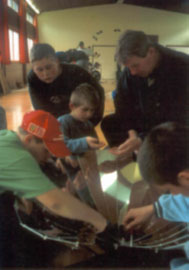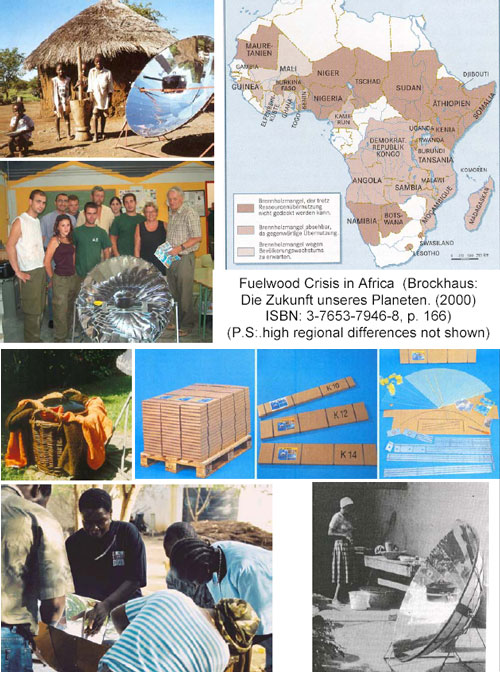Solarenergie für Afrika
Konferenz in Düsseldorf vom 4.-6. September 2003
Spreading of Solar Cooking
with prefabricated Solar Cookers by the Educational SystemFinancing of Large Solar Cooker Projects in the Framework of CDM


pictures:
Solar Cooker Course at
a Bavarian School
Parabolic solar cookers K10
(1 m diameter) and K14 (1,4 m diameter)
have been assembled by pupils
using solar cooker kits.
For large projects the price
of one K14-kit is below 80 Euro,
K10-kit is below 50 Euro.
The deficit of fuelwood in Africa is estimated to be higher than 300 million m³ per year - with growing tendency. As soon as the consequences of the firewood crisis will be visible for all, appropriate measures will come too late. The consequences can be alleviated by using more efficient cook stoves, fuel saving methods, heat-retaining containers (e.g. hay baskets) and by forestation. But for sustainable development solar cookers are essential. In the last years solar cooker development has solved the practical problems of solar cooking. Earlier reservations against solar cooking are no more valid.
The high number of necessary solar cookers - millions in Africa - and the necessary care needs solutions, which uses existing structures. Advantageous is the spreading by the educational system using prefabricated solar cookers. The pupils make the cookers from the prefabricated components in the handicraft lesson instructed by a teacher. They learn - if possible together with her mothers - to use and to maintain the cookers. Solar cooking will become part of the education. This "experience-education" can be enforced by the involvement of personalities, according to the "Munich Model".
Solar cooker projects avoid the emission of CO2 and other greenhouse gasses if they are implemented in regions affected by fuelwood crisis or if they replace fossil fuel. Cost per saved metric ton of CO2 is low (e.g. 4 Euro/t). These projects are transferring modern technologies for sustainable development, which could not be spread in the necessary scale without the bonus for CO2-reduction. Therefore they are excellently suitable for cooperation of developing countries and industrialized countries for climate protection. For this cooperation the Kyoto Protocol has defined the Clean Development Mechanism (CDM). CDM-funds have been established, e.g. by the World Bank. The schools can do the monitoring of the CO2-reduction due to the use of solar cookers. For establishing the framework for CDM-Solar-Cooker-Projects the support of the concerned governments is essential.
About baseline-definition and monitoring plan for spreading of solar cooking technology by the educational system
CDM Solar Cooker Projects should be combined by reforestation measures and spreading of fuelwood saving methods (energy saving stoves and cooking by retained heat) for achieving a sustainable solution to overcome the firewood crisis. Incorporating these efforts into the educational system combines a multitude of advantages. Baseline definition to show potential of greenhouse gas-reductions of the project should include all these potentials. Monitoring of realized CO2-reduction can be performed by the educational system. Establishing a simple and reliable monitoring procedure is essential for crediting CO2-reductions (CERs) to the project.
Detailed information about Clean Development Mechanism (CDM):
www.unfccc.int (UN Framework Convention on Climate Change)
www.bmu.de (German Federal Ministry of Environment)
www.netinform.de (TUEV Sueddeutschland, accredited certifier (OE) for CDM-projects)

 pictures:
pictures: